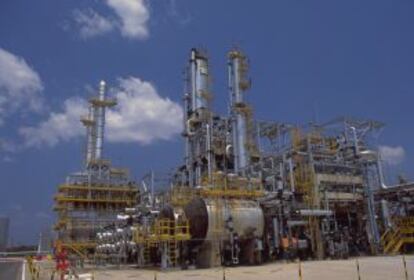Petrobras struggles to regain investors’ confidence
Putting fuel prices in Brazil in line with global market rates is a political dilemma for Rousseff

Petrobras has not had it easy these days. After 16 percent of its total market value dropped last year and it saw its ratings cut last October, the Brazilian oil giant – the target of investors’ doubts – struggles to keep afloat. Its balance sheets for 2013 show just 305 billion reals (about $130 billion) in revenues – just about eight percent more what it raked in the year before.
Petrobras will have some $220 billion to invest, principally in exploitation and production of prime materials (70 percent of its total investment), in its refinery and international operations. That investment goal is smaller than what it had planned to spend last year, but much closer to the oil firm’s financial reality. Petrobras officials are trying to sell off some of the company’s holdings and cut internal costs to reduce its debt.
“We made the biggest investment in our history last year, 24 percent more than in 2012, including the issuance of shares in Libra [the large ultra-deep water oil prospect located in the Santos Basin],” explained Petrobras president Graça Foster in a recent discussion with analysts.
But there is a mad rush to balance its books. The company’s liquidated debt rose 50 percent in 2013 compared to the previous year, standing at some $94 billion. The company has also had difficulties with its stock value, which dropped from 30 reals a share three years ago to 13 reals today.
Petrobras is now focusing its efforts on three areas: increase production, profits from making its operations more efficient and a readjustment in its fuel prices, which could affect the government’s commitment to control inflation.
Price hikes in the cost of gasoline and diesel is one way in which Petrobras could regain investor confidence. Last year, there were three adjustments in diesel prices (20 percent in total) and two in gasoline prices (11 percent), which was expected to help the company. “But the currency devaluation of the real was significantly higher and again there was no actual compatibility with the prices on the international market,” said Foster during the presentation.
With a daily production of 2.3 million barrels of oil and natural gas, the company hopes to double its output by 2020 and demonstrate its capability to surpass its competitors. Production is set to increase this year with operations starting on P-58 platform, in the Baleias prospect, some 85 kilometers from the coast of Espírito Santo state. Two other platforms are expected to be in full operation sometime in the first quarter in 2014 at the pre-salt layers in Bacia de Campos. Foster believes that Brazil will be self-sufficient in petroleum products from 2020 and will end its dependence on imports.
But the need to put Brazilian oil prices in line with the international market should be a top priority, according to experts. But no doubt it is a delicate issue that will have to be negotiated with the government of President Dilma Rousseff.
“If Brazil wants a solid company, it needs to allow its prices to go in line with market,” said Leonardo Maugeri, former president of the Italian company Eni who is now a Harvard University researcher. But just focusing on this measure, Maugeri said, is not enough to guarantee that Petrobras will be profitable once again. It also needs to focus on selling more stock, he said.
Its divestments brought in some 8.9 billion reals to the company’s coffers last year. But “it is a very low amount for a company that needs to increase its value in the short term,” he said.
Cesar Guzzetti, a specialist with Gaffney Cline, said that Petrobras has already sold 10 to 15 percent of the total stock it plans to issue in the coming years.
“We believe that the company has excellent shares in its portfolio, a potential for impressive growth, but the government with its negative effects, could take it on a long and difficult road which many investors want to avoid,” according to a HSBC report.
Tu suscripción se está usando en otro dispositivo
¿Quieres añadir otro usuario a tu suscripción?
Si continúas leyendo en este dispositivo, no se podrá leer en el otro.
FlechaTu suscripción se está usando en otro dispositivo y solo puedes acceder a EL PAÍS desde un dispositivo a la vez.
Si quieres compartir tu cuenta, cambia tu suscripción a la modalidad Premium, así podrás añadir otro usuario. Cada uno accederá con su propia cuenta de email, lo que os permitirá personalizar vuestra experiencia en EL PAÍS.
¿Tienes una suscripción de empresa? Accede aquí para contratar más cuentas.
En el caso de no saber quién está usando tu cuenta, te recomendamos cambiar tu contraseña aquí.
Si decides continuar compartiendo tu cuenta, este mensaje se mostrará en tu dispositivo y en el de la otra persona que está usando tu cuenta de forma indefinida, afectando a tu experiencia de lectura. Puedes consultar aquí los términos y condiciones de la suscripción digital.








































